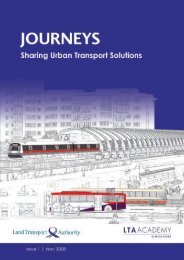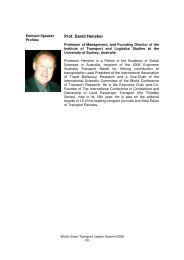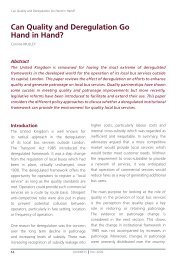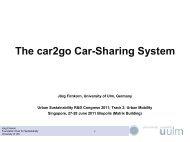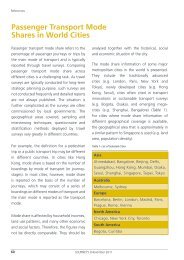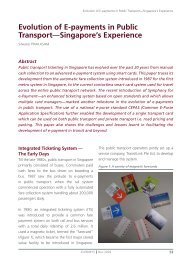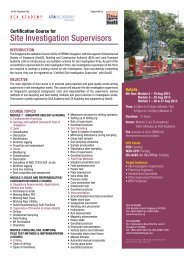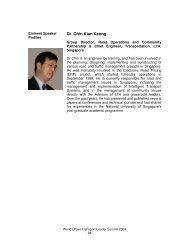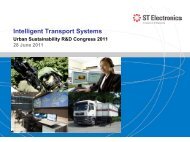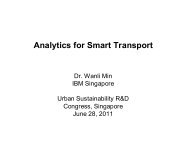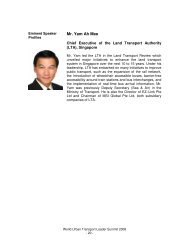journeys - LTA Academy - Land Transport Authority
journeys - LTA Academy - Land Transport Authority
journeys - LTA Academy - Land Transport Authority
You also want an ePaper? Increase the reach of your titles
YUMPU automatically turns print PDFs into web optimized ePapers that Google loves.
Benchmarking | Tony M RIDLEY<br />
Because benchmarking regularly involves partnerships between organisations<br />
that may be competitors, often using confidential information, a high degree of<br />
trust is equally important in ensuring a successful benchmarking. Thus the partners<br />
have to work out a formal method of working.<br />
Finally, it is also crucial that managers understand three aspects of productivity<br />
performance, i.e. those that are:<br />
• Under the control of the organisation;<br />
• Inherent in the cost structure of the industry; and<br />
• Pertain to the particular geographic and economic circumstances that a<br />
metro operates in.<br />
Given that transport is a highly politicized occupation, managers need to<br />
understand these distinctions if only in “self defence” against their masters.<br />
My simplest example of this relates to a comparison of the financial fortunes<br />
of the two metro operators in Hong Kong and Singapore, i.e. Mass Transit<br />
Railway Corporation (MTRC) and SMRT Trains Ltd (SMRT) respectively. Both<br />
Hong Kong and Singapore have world class metro systems. In Hong Kong,<br />
MTRC’s revenue has covered the metro’s operating, maintenance, renewal<br />
and construction costs. In Singapore, construction costs were not covered by<br />
SMRT’s operating revenue. Does this mean that the people in Hong Kong were<br />
somehow better than the people in Singapore? Not at all. The circumstances<br />
are very different, including the urban densities and the different financing<br />
frameworks. The point is that both Hong Kong and Singapore defined their<br />
own objectives in their own context and met them—but importantly, met<br />
them in an affordable way.<br />
Service<br />
All of the discussion so far has focused on what the engineer or the operator<br />
can do to make their system, or their project, more productive or efficient.<br />
But this, on its own, is “old engineering”. Today’s engineers and operators<br />
recognize that the economic concept of supply and demand is essential<br />
to their task. Thus service to the customer becomes paramount. Other<br />
engineers may have to deal with the complexities of steel, concrete, water,<br />
electricity and the like. Those of us in the transport business have to deal<br />
with the most difficult “material” of all—people.<br />
40 JOURNEYS | Nov 2008



